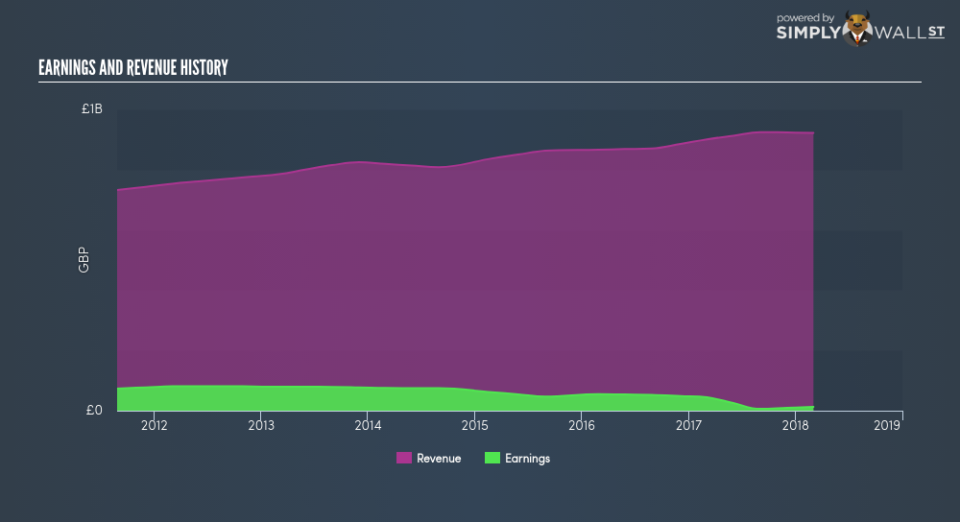Should You Be Concerned With N Brown Group plc’s (LON:BWNG) -71.81% Earnings Drop?

Measuring N Brown Group plc’s (LON:BWNG) track record of past performance is a valuable exercise for investors. It allows us to understand whether or not the company has met or exceed expectations, which is an insightful signal for future performance. Today I will assess BWNG’s recent performance announced on 03 March 2018 and compare these figures to its historical trend and industry movements. See our latest analysis for N Brown Group
Did BWNG perform worse than its track record and industry?
BWNG’s trailing twelve-month earnings (from 03 March 2018) of UK£12.50m has more than halved from UK£44.30m in the prior year. Furthermore, this one-year growth rate has been lower than its average earnings growth rate over the past 5 years of -17.67%, indicating the rate at which BWNG is growing has slowed down. What could be happening here? Let’s examine what’s going on with margins and if the entire industry is experiencing the hit as well.
Revenue growth over the last couple of years, has been positive, nevertheless earnings growth has been deteriorating. This means N Brown Group has been growing expenses, which is harming margins and earnings, and is not a sustainable practice. Viewing growth from a sector-level, the UK online retail industry has been growing its average earnings by double-digit 23.99% over the prior year, and 26.76% over the previous five years. This shows that any uplift the industry is profiting from, N Brown Group has not been able to realize the gains unlike its average peer.
In terms of returns from investment, N Brown Group has not invested its equity funds well, leading to a 2.72% return on equity (ROE), below the sensible minimum of 20%. Furthermore, its return on assets (ROA) of 2.02% is below the GB Online Retail industry of 7.21%, indicating N Brown Group’s are utilized less efficiently. And finally, its return on capital (ROC), which also accounts for N Brown Group’s debt level, has declined over the past 3 years from 12.23% to 8.29%. This correlates with an increase in debt holding, with debt-to-equity ratio rising from 56.03% to 88.12% over the past 5 years.
What does this mean?
N Brown Group’s track record can be a valuable insight into its earnings performance, but it certainly doesn’t tell the whole story. Usually companies that face a prolonged period of decline in earnings are undergoing some sort of reinvestment phase with the aim of keeping up with the recent industry disruption and growth. You should continue to research N Brown Group to get a better picture of the stock by looking at:
Future Outlook: What are well-informed industry analysts predicting for BWNG’s future growth? Take a look at our free research report of analyst consensus for BWNG’s outlook.
Financial Health: Is BWNG’s operations financially sustainable? Balance sheets can be hard to analyze, which is why we’ve done it for you. Check out our financial health checks here.
Other High-Performing Stocks: Are there other stocks that provide better prospects with proven track records? Explore our free list of these great stocks here.
NB: Figures in this article are calculated using data from the trailing twelve months from 03 March 2018. This may not be consistent with full year annual report figures.
To help readers see pass the short term volatility of the financial market, we aim to bring you a long-term focused research analysis purely driven by fundamental data. Note that our analysis does not factor in the latest price sensitive company announcements.
The author is an independent contributor and at the time of publication had no position in the stocks mentioned.

 Yahoo Finance
Yahoo Finance 
